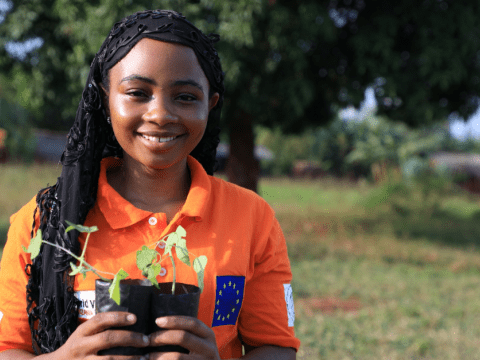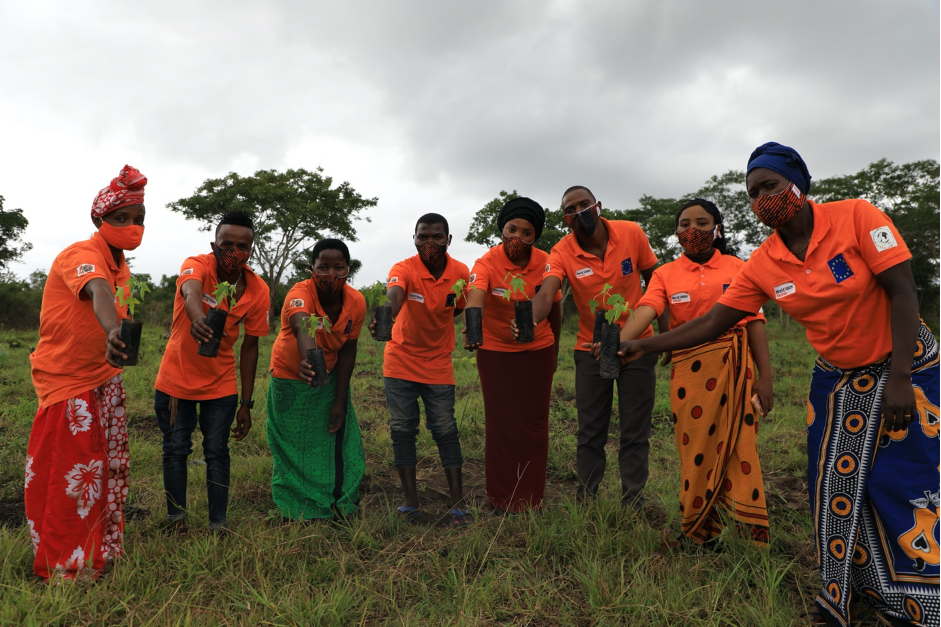The voices that call for change in Tanzania's coastal region of Tanga

Despite the Tanzania National Climate Strategy of 2012, the Eastern coastal region of Tanga has been experiencing increased deforestation due to poor control and planning, and degradation of coastal habitats. This called for action.
World Vision decided to engage youth from the coastal region in taking urgent actions to combat climate change and its impact on their community, through the SAUTI Youth Project. The project empowers girls and boys to be strong voices to improve community welfare in various issues focusing mostly in the area of climate change.
The SAUTI Youth Project also advocates for an end to child marriage, and encourages environmental preservation.
“There was a high risk of early marriages and pregnancies among girls, and people cut down trees without a plan. Many young girls and boys didn’t know if they could voice up and defend themselves or fight for their rights”, narrates Rashid Salim Rashid, the Village Executive Officer for Ugweno.
A total of 2,665 direct beneficiaries and 857 participants have benefited from the project, having planted more than 7,500 trees and distributed 12,000 trees to other community members.
Amongst the beneficiaries are 25 young boys and girls, members of “Kwa Pamoja Tunaweza Youth Group” (Together We Can Youth Group) in Ugweno village in Tanga region. They have been empowered by the SAUTI Youth Project and have become voices of change in their community.
Before World Vision initiated the project in their village, many young girls and boys had no voice in many issues which affected their lives. Though the law acknowledges their rights, they didn’t have a platform or a representative to speak for them.
Not only that; they also lacked knowledge and capacity on climate change mitigation and adaptation strategies, which limits their engagement in action. This lack of knowledge on climate change resulted in some youth engaging in income generating activities which have negative impacts on the environment, such as unsustainable charcoal making, timber production, shifting cultivation and illegal mining.

It was not easy to unify community members back then, because many youth felt left out and as a result, they decided to stay away from any community activities that needed their presence.
“Back then, we had platforms which we wanted to invite the youth to share their views but it was difficult because we didn’t seem to have some capable youth. Many of them felt left out and they didn’t want to be involved”, says Rashid.
World Vision has conducted a series of trainings to youth groups and leaders, on leading community advocacy through Citizen Voice and Action. These trainings help in strengthening relationships and direct accountability among youth and local leaders as they come to work together for the common goal.
“We have seen the impact of the SAUTI Youth Project to our youth; it is very easy to get help from them nowadays. I remember they once did a survey and helped us construct a road in our village. They have really worked hard and we, as a government, gave them five acres of land. They used two acres to plant a thousand trees, which has improved our environment”, says Rashid.
The village executive further adds: “They have been conducting campaign rallies addressing eradication of child marriage, and sexual violence against children. They are also conducting community sensitisation on the importance of climate change, which is the area they have been equipped the most through the SAUTI Youth Project.”

Kwa Pamoja Tunaweza Youth group is the best union of change-makers. They have been planting trees and selling them to add to their income, and the money they have been receiving has been used to help their members in solving various issues.
The group also uses art to send messages to the wider public, exploiting various opportunities. They have been invited to various platforms to perform drama or music, which they use to advocate for the ending of early/child marriages, ending sexual violence against children, and motivating the community to plant more trees to help preserve the environment.
The trainings have helped these youth to realise best ways of addressing issues of climate change. One of them is Amina Athuman (20), a female member of Kwa Pamoja Tunaweza youth group. She explains: “Before World Vision’s SAUTI Youth project I didn’t know the importance of planting tree. I used to think drought was just a normal challenge, and I didn’t know the magnitude of its effect. Another challenge that we used to have was the scarcity of water in our village, which was a result of climatic changes, but I was not aware of that.”
As a member of the group, Amina was not a believer in planting a tree. She was not able to connect what was happening in her village to what was happening in her environment. It was after the training of World Vision that she realised that planting trees was key to tackling the effects of climate change and cultural issues like child marriage in her village.
Amina continues: “It is true there was drought, and sometimes children were getting married at a young age. I didn’t see how it had anything to do with me, but it was because I didn’t have all the necessary knowledge and therefore, I never bothered to do anything. These didn’t seem as challenges to me at all.”
Amina has transformed from a quiet girl to a champion of change. She is motivated to make sure there are more trees planted in her community. Today, she aspires to improve the lives of her younger siblings who are looking up to her by speaking up to make sure there are no early marriages and children stay in school.
On top of that, her group has planted trees in schools where she addresses issues of girls’ rights at her village.
“I have been voicing up for my siblings and other children in my community, after World Vision involved me with SAUTI Youth. I became aware of the issues that I can address and am thankful to our local leader; he has given us a platform that we use to address many issues and defend ourselves”, concludes Amina.
SAUTI Youth Project interventions are targeting to create young leaders who will not only spearhead proper utilisation of resources for conservation of the environment, but also who will raise their voices to empower more youth inclusion in community development committees.
Rajabu Iddi is a chairman of Kwa Pamoja Tunaweza youth group and through the SAUTI Youth Project, he has managed to mark his presence in the community development committee as a youth representative.
“Before World Vision’s SAUTI Youth Project I spent my time aimlessly. I used to involve myself with peer groups which weren’t friendly, and therefore it was easy to say I had no purpose. A lot has changed in a short while; after World Vision’s intervention, I have become a youth representative in the community development committee. I was chosen as a chairperson for Kwa Pamoja Tunaweza youth group which is from World Vision. My goals are high, and I am more motivated”, says Rajabu.
The highly motivated champion says he has been keen on his ambitions. The thing he admires the most is making sure his group plants more trees than they have planted before. Through the SAUTI Youth Project and local government offices, he has managed to secure 1,000 trees and recently he bought 200 more.
“World Vision has really helped us through the SAUTI Youth Project. They empowered me with enough knowledge on how to plant trees, but also I have been using my position to influence the government to support us and they have given us five acres of land on which I planted 1,000 trees in two acres and am adding 200 more so we can help preserve the environment”, Rashid concludes.
---
SAUTI-Youth is a European Union co-funded project lead by World Vison in Ireland, in partnership with Youth Work Ireland Galway and World Vision in Tanzania. This account was created and maintained with the financial support of the European Union. Its contents are the sole responsibility of World Vision in Ireland and do not necessarily reflect the views of the European Union. Please visit the European Union at https://europa.eu/european-union/index_en.